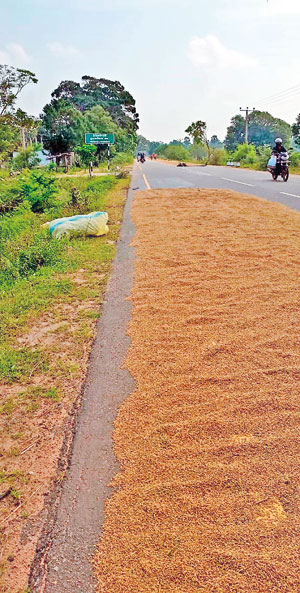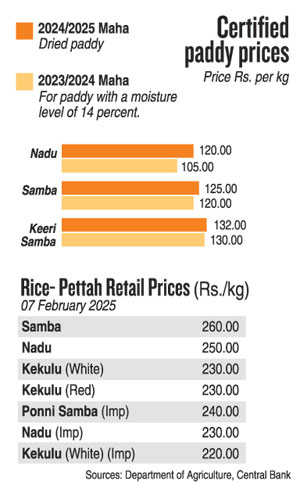News
Govt. paddy price fails to help Vavuniya farmers, many forced to sell to private collectors
View(s):By S. Rubatheesan
On Thursday, a day after the government announced the minimum purchase price for paddy, farmers in Vavuniya contacted the regional office of the Paddy Marketing Board (PMB) – only to be told that they could start work only the next day, as they had not received allocated funds.
The disappointed farmers were turned back, and among them, some had already made up their mind to sell their Nadu harvest to a private paddy collector at Rs 125 – five rupees higher than the government-announced price.

Water in flooded land plots are yet to recede in Kilinochchi
T. Sanmugam from Vairavapuliyankulam, Vavuniya, had cultivated three acres of land but lost more than half of it due to unexpected rains. He said he got only 23 bags of paddy as a total harvest.
Most of the cultivated land was flooded, making it difficult to harvest, either by using machinery or manual labour.
“Farmers are wondering whether they would be able to meet the cost of harvesting the paddy by selling at this rate since the harvest was significantly low and no yield either,” Sanmugam told the Sunday Times.

Paranthan- Mullaitivu: Farmers taking paddy harvest to the road due to shortage of drying facilities in the district
“Worse still, we cannot sell the rice at a decent price to meet our expenses,” the veteran farmer said, pointing out that private millers are offering a lower price for wet paddy at the farm gate compared to the government’s declared prices for dried paddy varieties.
Farmers are also forced to bear other expenses, such as transporting the harvest to the paddy collecting point, at Rs 70 for each bag of paddy, whereas the private millers are willing to collect at the farmgate itself.
“Since we have to repay our loans and other financial commitments, most of the farmers are forced to sell their harvest to private millers and collectors,” he said.
In Vavuniya, the Maha harvest is currently underway even though at least 2547.5 acres of paddyland were destroyed due to recent inclement weather and unfavourable weather patterns that prevailed at the end of last year.
Vavuniya’s Agrarian Development Services Deputy Commissioner said that out of a total of 60,831 acres of paddyland cultivated in the district, 11,940 acres have been harvested so far.
The issue of paddy pricing was also raised in Parliament this week when Jaffna district MP S. Shritharan pointed out that the government’s announcement came a bit late, as some of the districts in the North and Eastern provinces saw nearly seventy per cent of the harvest being completed so far.
With harvest underway in full swing in Anuradhapura, Polonnaruwa, Ampara and other districts in the country, the farmers are alleging that the current paddy price range set by the government is not reasonable considering the cost of production.
Meanwhile, farmers alleged that private millers, paddy collectors and middlemen are offering prices from Rs 85 to Rs 100 for dried paddy depending on the paddy variety, disregarding the control prices announced by the government this week.
To meet the cost of production, the farmers’ unions in several districts demand that the dried paddy should be purchased at least in the range of Rs 130-140 to ensure their livelihood.
Addressing a news briefing this week, Organisation for the Protection of Farmers’ Rights Association chairman A. Kulatunga said that farmers are at the receiving end, where they find themselves in a difficult position to cover the expenses of the cultivation at the current control price – let alone any profits since there was no yield in several areas.
With the Maximum Retail Price (MRP) for rice (red Nadu) fixed at Rs 230 per kilo, the price of paddy should be Rs 115 per kilogram, along with nearly thirty per cent to be added as a production cost, explained Prof Buddhi Maramabe of the Department of Crop Science, University of Peradeniya, on the rationale behind paddy pricing.
However, according to the Department of Agriculture, the cost of production is decided as Rs 88, 
“The cost of production borne by farmers varies from region to region. In Ampara, the price of the cost of production is fixed at the range of Rs 55-62 considering the yield rate by the Department of Agriculture last year,” he noted.
In the North, those farmers who prefer to dry their paddy and sell it at a slightly higher rate find it extremely difficult to find room to dry their harvest.
As a result, they take their paddy harvest to the main roads and dry them along pedestrian paths or in a zig-zag formation to let the traffic flow.
To secure a space on the Paranathan-Mullaitivu road, farmers had to turn up by 5 a.m. with their paddy harvest.
M. Sivamohan, Secretary of the Iranaimadhu Farmers Federation in Kilinochchi, said there is an urgent need to develop drying space facilities in the district, as only privately run drying facilities are currently in operation, forcing farmers to take their harvest to the roads.
The best way to say that you found the home of your dreams is by finding it on Hitad.lk. We have listings for apartments for sale or rent in Sri Lanka, no matter what locale you're looking for! Whether you live in Colombo, Galle, Kandy, Matara, Jaffna and more - we've got them all!

